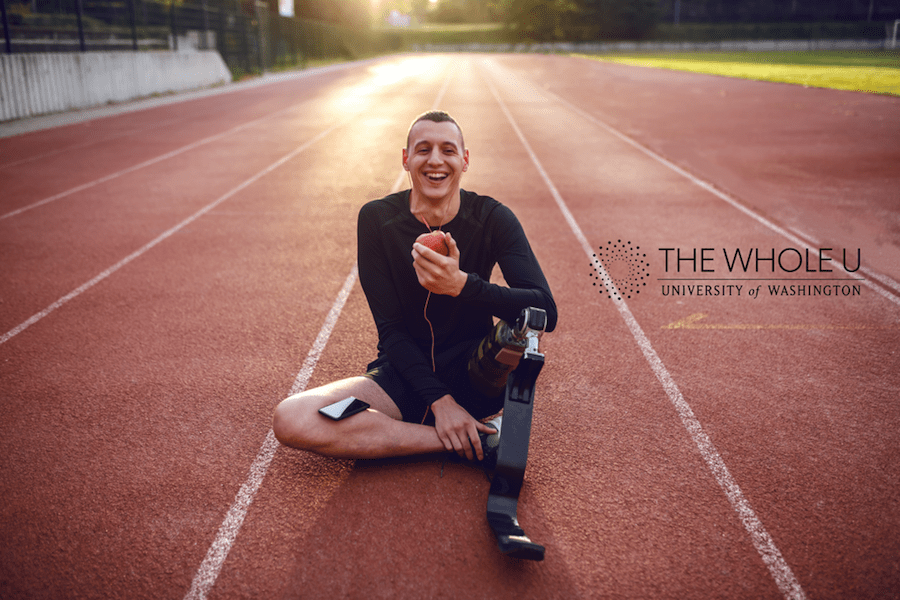
Fueling for Performance
 Many people begin the new year with the goal to improve exercise performance. How you fuel the body impacts muscle and organ performance, strength, recovery, and many other key mechanics your body uses when being active.
Many people begin the new year with the goal to improve exercise performance. How you fuel the body impacts muscle and organ performance, strength, recovery, and many other key mechanics your body uses when being active.
So how exactly does what we eat influence our body and physical performance? We enlisted the expertise of Dr. Elizabeth Kirk, senior lecturer in epidemiology at the UW School of Public Health who studies how nutrition and diet influence sports performance and wellness, to answer just that.
Just as you’d work on basic skills to play a sport, it’s critical to form basic foundational nutrition skills that will support your sports performance goals.
So, what should we eat to perform better? How much should we eat, when, and why?
THE WHOLE U: What is performance nutrition?
ELIZABETH KIRK: Performance nutrition is a term that can be applied to virtually any setting. Classically, we think of the term as related to the sports and competition world. In that world, it refers broadly to adequate nutrition support to enable an athlete to meet their performance goals. It can also be applied to any endeavor: students, employees, supervisors, professionals, etc. Every person benefits when they nourish themselves adequately.
TWU: Where should people start when beginning to think about how what they eat contributes to performance?
EK: The first thing is to fuel! Some people get caught in habits of not making time for eating—or even shopping.
Having food available that is nutrient rich is important for all of us, no matter what we are doing. Nourishing before tackling a problem or an activity is critical not only for physical performance, but also to provide energy for the mental approach to the task at hand.
For most of us, a routine of breakfast, lunch, and dinner provides a solid foundation. If we are training during the day, then some specific recommendations around timing of eating and types of foods come into play for both before and after that activity. We are a resilient species. We can withstand many circumstances, including undernourishment. However, if we want to perform optimally, we should consider fueling the machine throughout the day.
TWU: Are there any recommended guidelines for hydration and exercise? How much to hydrate, how close to exercise, hydrating during, etc.?
EK: There are some specific guidelines provided by the NCAA sports performance institute and it’s important to consider those guidelines in the context of the environment of the activity, as well as the physiology of the person. Someone who sweats profusely and is being active in a hot environment will likely require different hydration practices than someone who doesn’t sweat as much and is active in a mild temperature.
TWU: What are some snacks that energize the body when we feel tired during the day?
EK: Go-to snacks include items such as nuts, dried fruits, fruits, cheese and cracker/bread/fruit, energy/granola bars, nutbutter sandwiches.
TWU: Are certain food groups better for fueling than others? Are there any food groups that hinder performance—types of food we should avoid before exercising?
EK: It is well established that the preferred fuel for working muscles and neurons, is glucose, a carbohydrate molecule. Enjoying carbohydrate-rich foods is an important piece of an athlete’s diet. Protein-rich foods are also of great value, and healthful sources of fats are valuable too.
In terms of hindering performance, there are a number of considerations: How close to exercise is the food being consumed? What type of exercise is going to happen and at what level of intensity? Is there a break between events during the day? In general, people should avoid eating too close to exercise to avoid an upset stomach or diarrhea—either of those would certainly hinder performance.
Apart from that, if the athlete is generally well nourished and well trained, their pre-event meal may be more a matter of habit and something they know will work for them. For some athletes that includes eggs, toast and coffee 3 hours before, for others it’s a banana and peanut butter 45 minutes before. There’s no singular answer to the pre-event eating approach, except in general we shouldn’t eat too close to the event.
TWU: How important are our nutritional choices after we exercise? What should we eat after a workout? Drink?
EK: Following intensive exercise, recovery is the priority. Recovery allows us to prepare for the next day’s intensive activities. We can replace important sources of energy and the support molecules that allow us to use the energy (vitamins and minerals). It’s useful to think of a two hour window of opportunity to replace those nutrients, but starting right away is ideal. A sports drink and sandwich or fruit/cereal bar is a good way to go. Some athletes enjoy protein shakes or smoothies after a session; my advice is to make sure they have a bagel, or sandwich, or fruit to go with that.
TWU: Are there myths around performance nutrition you’d like people to be aware of?
EK: There are plenty of myths, especially around sports supplements. Talking with a professional such as a Registered Dietitian is a way to navigate the maze of sports supplements to learn what’s actually effective, safe, and not contaminated with illegal substances.
Find more content for eating well here. Explore more resources, recipes, and guides for making healthy meals easy here.